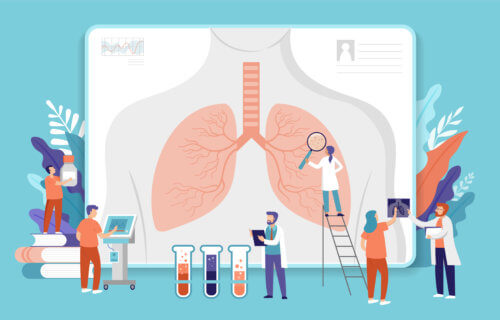PARIS — Could a vaccine for asthma dramatically lower rates for the respiratory ailment that plagues millions of children and adults? French researchers believe they have developed such a breakthrough that could stop asthma in its tracks. The inexpensive vaccine blocks immune system chemicals that trigger attacks, offering hope of a cure.
Using mice with a human form of the chronic lung condition, the therapy lasted for around three months. It opens the door to a “long term approach” for treating patients. Clinical trials are expected to start within two years.
Corresponding author Dr Laurent Reber, of France’s National Institute for Health and Medical Research, says the strategy is cost effective.
“It will be delivered as an intramuscular injection similar to most vaccines,” says Reber, per SWNS media. “Our pre-clinical data are very promising as they show the vaccine can promote long-term protection against major asthma features.”
According to the Asthma and Allergy Foundation of American, 1 in 13 people suffer from asthma. That includes 8 percent of adults and 7 percent of children. Currently, sufferers have to carry inhalers or pills to help open up their airways.
“Asthma is the most common chronic lung disease, affecting around 300 million people worldwide. At least 250,000 deaths are attributed to the disease each year,” says Reber. “An estimated 20 percent of patients suffer from uncontrolled, moderate-to-severe asthma, presenting with persistent symptoms, with reduced lung functions and recurrent exacerbations, despite the use of high-dose pharmacological therapy.”
Asthma vaccine shows promise in mice
The French team developed two compounds that block inflammation-fueling proteins known as IL-4 and IL-13 (interleukin 4 and 13). They are molecules that direct infection-fighting cells. But excessive production is dangerous, and can even be fatal.
Injections of the cocktail protected the mice in the study. Levels of an asthma-linked antibody called IgE were reduced, along with mucous production. And the benefits were long lasting, with up to 15 weeks of suppression, There were no side effects either, notes Reber.
What is more, it dampened the human version of IL-4 and IL-13 in genetically engineered mice for at least eleven weeks.
Antibodies that target IgE, IL-4 and IL-13 can reduce symptoms, but are costly and require frequent and lifelong reinfusion.
“Our results imply dual IL-4/IL-13 vaccination may represent a cost-effective, long-term therapeutic strategy for the treatment of allergic asthma as demonstrated in mouse models,” says Reber. “It was well tolerated and protected against key features of chronic asthma. Altogether, our results indicate long-term neutralization of both mouse and human IL-4 and IL-13 can be achieved through vaccination.”
Asthma is caused by an inappropriate response of the immune system. When sufferers are exposed to irritants or allergens, it launches what are called ‘Th2’ attacks to fight the invaders. Cytokines are the ‘messengers’ that coordinate them. In asthma patients it causes inflammation and excess mucous production making it difficult, and sometimes impossible, to breathe.
The findings, published in the journal, Nature Communications also open the door to revolutionizing the treatment of a host of other diseases.
“These results pave the way for the clinical development of an efficient long-term vaccine against asthma and other IL-4- and IL-13 mediated allergic diseases,” says Reber.
They range from food allergies and eczema to chronic urticaria, or hives a raised itchy rash caused by reactions to pollen, insect bites and chemicals. The researchers are already designing a first clinical trial with French drugs company NEOVACS to test the vaccine in asthma patients.
“It should start within two years,” says Reber.
SWNS writer Mark Waghorn contributed to this report.

Would it work for COPD wich is killing millions of people world wide